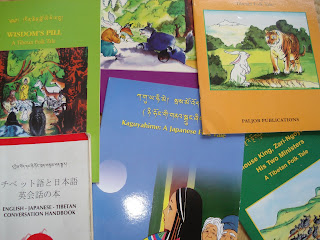Tibet House New Delhi, Nalanda Certificate Course / NCC1 / 1st Session (5/06/2022) Geshe Dorjee Damdul la's teaching
The life story of Buddha and the Three Turning of the Wheel of Dharma
ཟབ་ཞི་སྤྲོས་བྲལ་འོད་གསལ་འདུས་མ་བྱས། བདུད་རྩི་ལྟ་བུའི་ཆོས་ཤིག་བདག་ལ་བརྙེས།
སུ་ལ་བསྟན་ཀྱང་གོ་བར་མི་འགྱུར་བས། མི་སྨྲ་ནགས་འདབ་ཉིད་དུ་གནས་པར་བྱ།
Profound, peaceful, elaboration-free, clear light, and non-composite;
Such is the nectar-like Dharma I discovered.
Finding no one who can fathom this teaching,
In silence I retire into the woods.
The god Indra, Brahmas and others requested Buddha to teach. Buddha means fully awakened one.
Buddhism is more about compassion and wisdom. Here the motivation to become Buddha, a fully awakened one, to benefit all sentient beings. The teachings should spread compassion and wisdom.
When we are born, most of us cried the moment when we came to this world. It is our impulsive reaction to the discomfort and fear. So the suffering is reality from the very start of our life.
Is it possible to achieve zero percent suffering and 100 percent happiness? Buddha said this is possible. Buddha said that everyone has a Buddha seed and potential to get rid of sufferings and achieve happiness.
Acharya Dignaga, the 6th century logician, composed a text Paramanasamuchaya, a commentary on valid cognition. The salutation has the following two lines:
The one who has transformed into the Reliable Guide, motivated by altruism to benefit sentient beings, the Teacher, Sugata, and Protector, to You, I make prostrations.
After 100 years Acharya Dharmakriti, a 7th century scholar, saw this two line salutation and wrote commentary in 280 verses. Such is the depth and profundity of the salutation written by Acharya Dignaga.
We are all seeking fearlessness and happiness. We don’t know how to achieve it. We need a good guide or a teacher to lead us. We need an experienced guide.
Prince Siddhartha became an experienced guide. His teachings were the solution to our problem. He was Sugata, one who has overcome the self grasping ignorance and self centered attitude. He became our protector.
Buddha saw the seed of perfection, Buddha nature, within everyone. So he treated everyone equally. Male, female, caste system, etc. were not relevant to him.
Intrinsic nature of water is clear and pure. Dirt are of adventitious nature. Our mind how defile it may be, its nature is pure and clean. When the impurity and dirt are removed from the mind, fearlessness and infinite happiness come out.
Arya Maitreya, the future Buddha, in his text Uttratantra, has written that seed of perfection is within all of us. It is like a treasure box under the floor of a beggar's hut.
We need to know the nature of defilement or dirt in our mind to clean it properly. The defilements or the afflictions may be gross or subtle. Gross afflictions lead to Afflictive obscuration and stop you from attaining fearlessness or Nirvna. Subtle afflictions lead to Cognitive affliction and stop you from attaining infinite happiness or Buddhahood.
The cause of our suffering could be of external and internal factors. Sound of clap from two hands is metaphor of our misery. Two hands are metaphor for external and internal factors. Coming together of the two hands, the external and internal factors, causes misery. We usually identify our misery with the external factor and rarely blame ourselves. We may not be have control over the external factor, but we can control the internal factor.
Self grasping ignorance and self centered attitude are internal factors that we need to overcome to stop suffering and misery. Overcoming self grasping ignorance removes fears, and overcoming self centered attitude brings happiness. To get rid of these two self grasping ignorance and self centered attitude, Buddha conducted three classes of teaching. This is called the Three Turning of the Wheel of Dharma.
In the first turning of the wheel of Dharma at Sarnath, Buddha taught the Four Noble Truths. He said everything exist objectively. The target audiences were the followers of the Vaibhashika and Sautrantika schools.
In the second turning of the wheel of Dharma at Rajgirh, Buddha taught Emptiness. Here he said there is no objective existence, everything exist subjectively. The target audiences here were the followers of the Madhyamika school.
In the third turning of the wheel of Dharma at Vaishali, Buddha taught the mind only school, where the contradiction in the first and the second turning of the wheel of Dharma was dispelled. The target audiences here were the follower of the Chittamatra school.
Note: This is a student's note. Error and omissions are bound to be there. A serious student should study the actual teachings of the teacher, Geshe Dorjee Damdul la, from www.tibethouse.in website. I write these notes to help my understanding and recollections. (རང་གི་ཡིད་ལ་ངེས་ཕྱིར་ངས་འདི་བརྩམས། Tib:Rang gi yid la nges phyir ngas dhi brtsams).
*******
***********************************************
+012.jpg)
